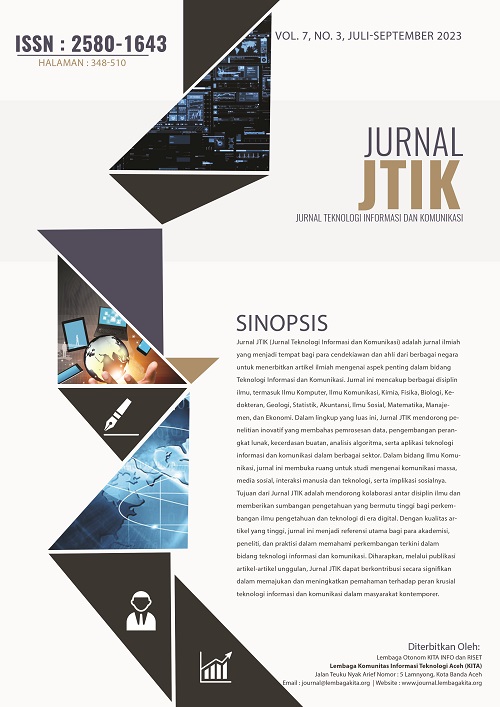Point of Sales Menggunakan Metode Agile Development pada Bengkel Mandala Motor
Main Article Content
Abstract
The development of the current Point of Sales (POS) system is very important for industry, especially for trading efforts, many business industries use digital recording or data collection systems. Mandala Motor Workshop is company engaged in the automotive sector, providing repair services and selling spare parts for two-wheeled vehicles. At this time the sales system that runs at the Mandala Motor Workshop is still manual in making business records, there are often mistakes when dividing the entire payment, there’s no recording of client information, recording inventory of goods written on paper notes, resulting risk of loss and inefficiency. Point of Sales (POS) is system can help the marketing business process of mandala motor repair shop. Each Point of Sales consists of hardware and applications, these 2 parts used for running business process. System design using Agile Development Method has six stages consisting of planning, implementation, testing, documentation, deployment, and maintenance. Aimed assisting management in checking marketing reports directly, making easier for industry to carry out marketing business, inventory, client information and producing good communication for companies, employees, clients. This application has also been evaluated using the Software Usability Scale (SUS) method, where the average of 200 respondents, namely 76.6%, is included in the acceptable application acceptance level category, the grade level category is in position C, and the adjective rating category be in position. acceptable so that it can be concluded that the application is suitable for use by users and has been fulfilled.
Downloads
Article Details

This work is licensed under a Creative Commons Attribution-NonCommercial 4.0 International License.
The Authors submitting a manuscript do so on the understanding that if accepted for publication, copyright of the article shall be assigned to JTIK journal and Research Division, KITA Institute as the publisher of the journal. Copyright encompasses rights to reproduce and deliver the article in all form and media, including reprints, photographs, microfilms, and any other similar reproductions, as well as translations.
JTIK journal and Research Division, KITA Institute and the Editors make every effort to ensure that no wrong or misleading data, opinions or statements be published in the journal. In any way, the contents of the articles and advertisements published in JTIK journal are the sole and exclusive responsibility of their respective authors and advertisers.
The Copyright Transfer Form can be downloaded here: [Copyright Transfer Form JTIK]. The copyright form should be signed originally and send to the Editorial Office in the form of original mail, scanned document or fax :
Muhammad Wali (Editor-in-Chief)
Editorial Office of Jurnal JTIK (Jurnal Teknologi Informasi dan Komunikasi)
Research Division, KITA Institute
Teuku Nyak Arief Street Nomor : 7b, Lamnyong, Lamgugop, Kota Banda Aceh
Telp./Fax: 0651-8070141
Email: jtik@lembagakita.org - journal@lembagakita.org
References
Kurniati, N. and Nasruddin, N., 2021. Implementasi Pengaplikasian Point of Sales (Pos) Untuk Pengelolaan Sistem Informasi Pada Toko Nurfalah Kabupaten Lombok Timur. Nusantara Hasana Journal, 1(3), pp.30-39.
Sudianto, A., Ahmadi, H. and Alim, A., 2020. Rancang Bangun Sistem Informasi Penjualan Sparepart Motor Pada Bengkel Vinensi Motor Berbasis Web Sebagai Guna Meningkatkan Penjualan dan Promosi Produk. Infotek: Jurnal Informatika dan Teknologi, 3(2), pp.115-122. DOI: https://dx.doi.org/10.29408/jit.v3i2.2289.
Sumantri, E., Sholihati, I.D. and Nathasia, N.D., 2019, March. Aplikasi penghitungan waris dan Kitab Faraidh berbasis android menggunakan metode Tashih Al-Masail. In Prosiding Seminar Pendidikan Matematika dan Matematika (Vol. 1, pp. 90-96). DOI: https://doi.org/10.21831/pspmm.v1i0.22.
Alexander, J., 2021. Implementasi Point Of Sales Berbasis Web Pada Usaha Olive Café. JUSIBI (Jurnal Sistem Informasi dan E-Bisnis), 2(4), pp.452-465. DOI: https://doi.org/10.54650/jusibi.v2i4.230.

